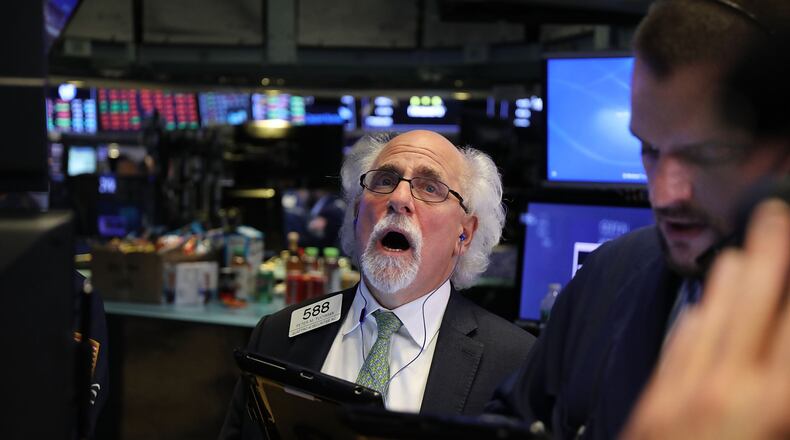MORE: How to protect against Medicare fraud, predatory sales
The market’s recent decline was set off by a sharp drop in bond prices and a corresponding increase in yields last week and early this week. And there are lingering concerns about the unresolved trade dispute between the U.S. and China. Strong earnings reports in the upcoming weeks could soothe investor nerves, but any negative comments from company executives about future profits could have the opposite effect.
The benchmark S&P 500 index skidded 31 points, or 1.1 percent, to 2,753 at 11:20 a.m. Thursday after it fell 3.3 percent Wednesday, and the Dow Jones Industrial Average lost another 280 points, or 1.1 percent, to 25,317 after an 831 point plunge.
The Nasdaq composite fell 54 points, or 0.7 percent, to 7,367 after a 4.1 percent dive that was its biggest one-day loss in two years. The Russell 2000 index of smaller-company stocks shed 11 points, or 0.7 percent, to 1,563.
Stocks in Asia and Europe suffered even steeper losses.
France’s CAC 40 dropped 1.8 percent and the DAX in Germany lost 1.5 percent. Britain’s FTSE 100 sank 1.9 percent. In Asia, Tokyo’s Nikkei 225 gave up 3.9 percent and Hong Kong’s Hang Seng index shed 3.5 percent. The Kospi in South Korea fell 4.4 percent.
“Equity investors are surprised by the pace at which rates have risen,” Marcella Chow, global market strategist at J.P. Morgan Asset Management, said in a report.
The S&P 500 is on track for its sixth loss in a row and it’s down 5.9 percent over that span. The index hasn’t had a losing streak this long since a nine-day losing streak shortly before the 2016 presidential election. The benchmark index has climbed 29 percent since Donald Trump was elected.
Bond prices rose as the recent surge in yields attracted the attention of some investors. The yield on the 10-year Treasury note fell to 3.16 percent from 3.22 percent late Wednesday. That’s still sharply higher than it was a week ago, and earlier this week the yield on the 10-year note reached its highest level since mid-2011.
The drop in yields hurt banks, and JPMorgan Chase fell 1.9 percent to $109.35 while Bank of America sank 1.7 percent to $28.76. JPMorgan Chase and several other banks will report their third-quarter results Friday morning. Insurers and other financial stocks also slid.
In health care, CVS sank 4.9 percent to $75.06 and Aetna sagged 0.9 percent to $201.65 after the New York Post said regulators in the state have concerns about CVS’ purchase of the health insurer. The Justice Department approved the $69 billion deal on Wednesday.
Among technology companies, Apple gave up 0.5 percent to $215.31 but Microsoft gained 0.4 percent to $106.59. Alphabet, Google’s parent company, declined 0.6 percent to $1,085.50 and Amazon fell another 3.4 percent to $1,695.05.
Alphabet and Amazon are now in what’s known as a “correction,” a drop of more than 10 percent from a recent peak. They are the second- and fourth-most valuable U.S. companies. Facebook, which ranks sixth, has tumbled 30 percent since late July, and Netflix has fallen more than 20 percent, meeting the threshold for a “bear market.” The Nasdaq composite has fallen more than 9 percent since it set a record high in late August.
U.S. crude dropped 2.1 percent to $71.61 a barrel in New York. Brent crude, the international standard, dropped 2.2 percent to $81.24 a barrel in London. The price of gold jumped 2.2 percent to $1,219.50 an ounce.
U.S. corporate profits have been boosted this year by the lower tax rates put in effect by President Trump and the GOP. Now investors will be watching anxiously this earnings season to see if higher interest rates and the trade dispute with China are dimming the impact of the tax cuts.
On Wednesday, President Trump said the Federal Reserve “is making a mistake” with its campaign of rate increases and said the central bank “has gone crazy” by gradually raising interest rates over the last three years.
Sentiment also has been dimmed by the spreading U.S.-Chinese tariff fight over Beijing’s technology policy. The International Monetary Fund cut its outlook for global growth this week, citing interest rates and trade tensions.
The U.S. Treasury Department is due to release a currency report that some analysts suggest might change the official stance on China’s exchange rate policy, and the Justice Department announced Wednesday it arrested an official of China’s Ministry of State Security on charges of trying to steal trade secrets from U.S. aerospace companies.
The tensions hurt Chinese technology stocks. Tencent, China’s most valuable tech company, dropped 6.8 percent. Shares of Chinese smartphone maker Xiaomi Corp. fell by 8 percent.
The dollar fell to 112.17 yen from 112.59 yen, and the euro rose to $1.1571 from $1.1525.
The Associated Press
FIVE FAST READS
• Local mall announces new store coming two days in a row
• New store to open at Beavercreek mall
• Amazon boosts wages for area Whole Foods, Amazon workers
• New store opening in former Fairborn Kroger space
• New Centerville arts, crafts store announces opening date, giveaways
About the Author
